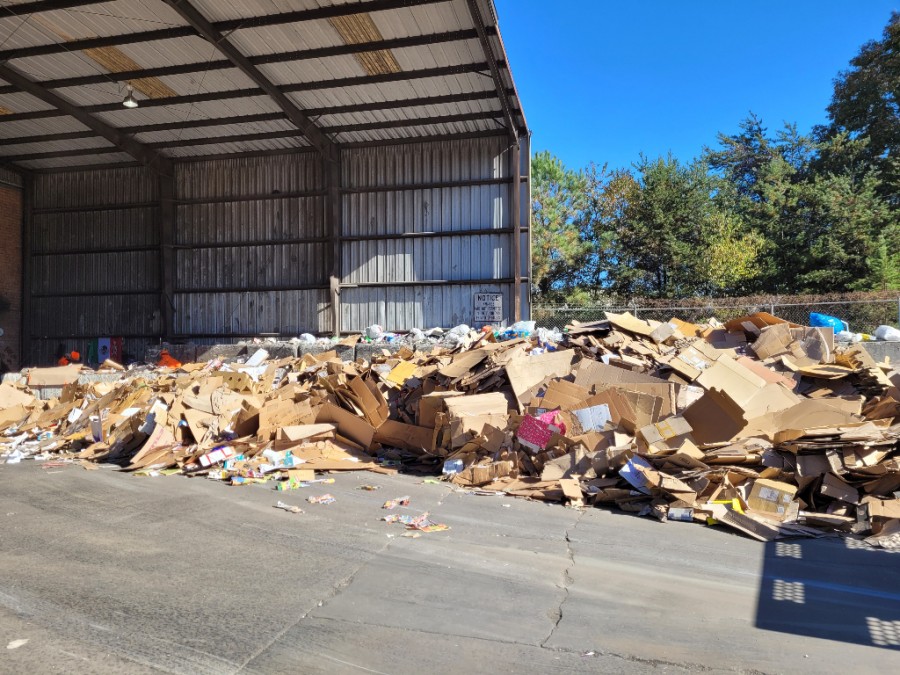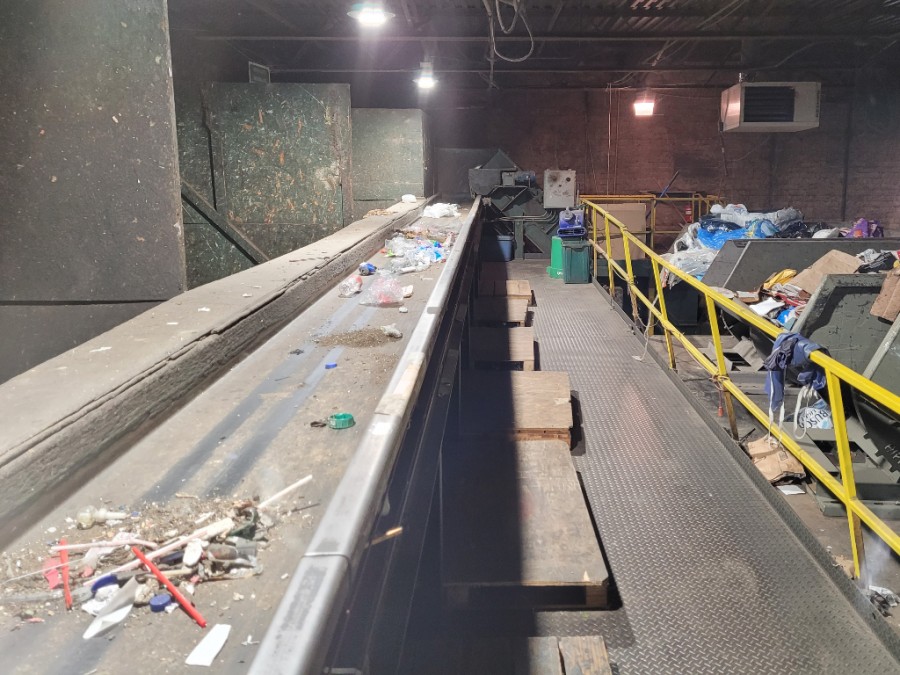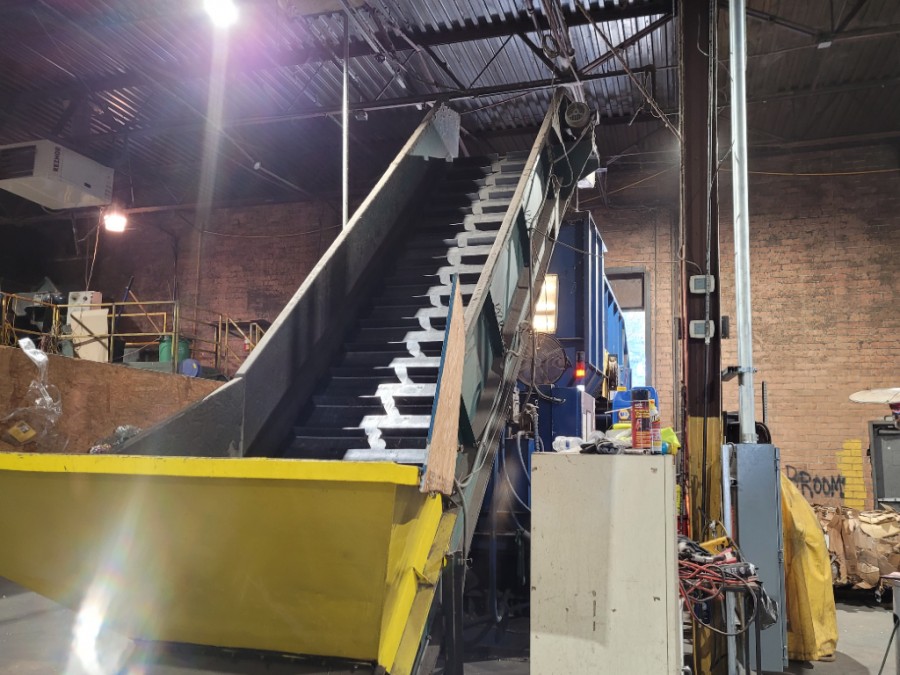From Mountain Dew bottles into carpet, milk jugs into culvert pipes and water bottles into shirts, the road reusable materials take from start to finish begins at the recycling center.
The Hall County Recycling Center on Chestnut Street in Gainesville sees a myriad of materials come through its doors on a daily basis, ranging from soda cans and bottles, laundry detergent containers, milk jugs, cardboard, glass, paper and more.
Assistant Solid Waste Superintendent Bobby Purdum accompanied AccessWDUN on a facility tour, showcasing the path materials take from start to finish at the center.
Once materials are dumped at the site on Chestnut Street, they are manually loaded onto a conveyor belt for sorting, and eventually placed on a baler to be bundled up and sold once enough material has been gathered.
“We do bid out every product that we have here, and so plastics, they typically get sold to the highest bidder,” Purdum said. “In the particular case of a milk jug — if it's colored or non-colored — if it's colored, it's typically made into culvert pipe that's coming down from your house or underneath the road. And it's also made back into milk jugs. It's flaked up, washed and then resold.”
Polyethylene bottles, which are designated as a number one plastic, are flaked and washed as well, and later shipped to Dalton, Georgia, where they are used to manufacture carpet, according to Purdum. One square yard of carpet is comprised of approximately 63 bottles. Additionally, polyethylene material from the center is also used to manufacture polyester shirts.
“Here in Georgia, we're kind of privileged to have great recycling markets in regards to a number one plastics,” Purdum said.
Number one plastics are designated as polyethylene terephthalate and are most commonly found in the creation of consumer food service products. Number two plastics are characterized as high-density polyethylene and are used in things like milk jugs, trash can liners and cleaning bottles.
With seven different classifications of plastic, there are only certain types the recycling center can process, with number one plastics being the easiest to repurpose.
The biggest money-maker for the center comes from paper, which represents approximately 65% of a consumer's waste stream, according to Purdum. Most paper that is recycled gets turned back into paper, or other similar materials, such as UPS and Amazon shipping boxes.
One of the biggest misconceptions Purdum sees with recyclable materials is when products are joined with other materials that cannot be recycled.
“Problematic things that you have is when plastics are joined with other materials like metals and things like that, when they're combined together,” Purdum said. “You have two different types of plastics that are mixed together and that would be problematic when you can't get those apart. Sorting-wise, if it's a single type of product, it's easy to recycle.”
While the center does recycle metal, they can’t recycle it if it’s attached to something else that is non-metal. Oftentimes, Purdum sees what he called “wishful recycling,” wherein people will recycle a product that can’t be sorted appropriately or something that has multiple materials combined together, in hopes that it will be recycled on the back end.
Wishful recycling unfortunately only causes more time to be wasted by center employees, and in some cases, can damage baler and sorting equipment, such as when garden hoses get tied up in machinery.
A simple solution to this issue, Purdum noted, is if a consumer has to think long about whether something should be recycled, it more than likely can’t be.
“The hands-down reason for recycling is that it saves landfill space,” Purdum said. “We are burying everything in the ground. We here at the recycling center are trying to save that area, so the more that we can recycle, the better off the landfill is.”
Another reason Purdum noted to stay up on recycling is due to the oil usage in manufacturing plastics.
“When we make plastics, it uses 8% to 10% of the world's oil,” Purdum said. “Why would you not want to recycle the plastic and not have to rely on the oil that needs to be manufactured.”
By comparison, the average consumer throws away approximately 520 grocery bags per year. While the recycling center can’t recycle those bags, Purdum said most local grocery stores will accept clean and dry bags that have been used. Interestingly, the oil used to create 520 bags is equivalent to approximately 60 miles worth of gasoline in a car, Purdum said.
The baler at the Hall County Recycling Center has been chugging along well for the past nine years, but given the population growth and increase in recycled materials seen at the center, a new baler is set to be delivered in January.
While the current baler is worth $365,000, the new bailer will increase productivity and be larger in scale, coming in at a price tag of $950,000.
“We need to keep up with the population,” Purdum said. “If you've got more population, you got more trash, you have more recyclables, and we need to keep up with that in regards to our landfill space and recycling operations.”
The Hall County Recycling Center accepts all paper and cardboard materials that are not waxed, including magazines, copy paper, pizza boxes, beer boxes and books. They also accept many different plastic types, such as bottles that are empty and clean, including milk jugs, water bottles and spray bottles.
They also will take glass jars and bottles and other glass-only containers, along with metal and aluminum from cans, tins and foil.
Finally, they will also recycle cooking grease, motor oil, brake fluid, wooden pallets, clothing, small electronics and mulch.
Some common items that the center will not recycle include furniture, hoses, plastic bags, styrofoam, wire, ceramics, light bulbs, toys and mattresses.
For a full list of locations where consumers can drop off their recyclable goods, click here.













